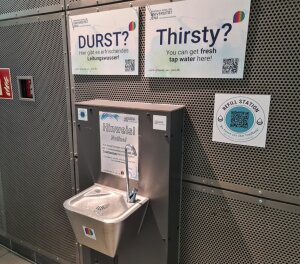
Drinking water dispenser in Carl-Zeiß-Straße 3
Image: Sabrina StanglDrinking water dispenser
In front of the Uni-Shop in Carl-Zeiß-Straße 3 and in the Dining Hall Ernst-Abbe-Platz are drinking water dispensers. Here you can easily fill up your bottles. This saves resources in production and packaging compared to mineral water. Tap water is very strictly controlled in Germany and can therefore be drunk without worries.
IS THAT RIGHT? Is tap water better for drinking than bottled water?
Prof. Dr Michael Stelter from the Chair of Technical Environmental Chemistry explains in the video:
placeholder image — Prof Michael Stelter explains in the video whether tap water is better than bottled water
Screenshot: Universität JenaLettering MensaRegional
Image: Studierendenwerk ThüringenRegional catering
Currently, at least 15% of the processed products are regional, which means they come from Thuringia. In addition, many products are grown, raised and processed in farms in the immediate vicinity. To recognize regional products, you have to look for the small "r" (photo). It symbolizes the regional products in the menus on the web, on the display boards and on price rails. More information about the Studierendenwerk's regional offerings, such as a complete list of all regionally sourced products, can be found on the associated websiteExternal link.
MensaVital lettering
Image: Studierendenwerk ThüringenMensaVital
MensaVital is a menu concept of the Studierendenwerk that focuses on healthy nutrition. Balanced recipes create wholesome and sustainable meals prepared from natural and fresh ingredients. More information can be found hereExternal link.
Vegetarian and vegan offers
The Studierendenwerk Thüringen offers at least one vegetarian and one vegan dish every day. In this way, it wants to contribute to more animal welfare, climate protection and a conscious diet.
Organic food
All dining halls of the Studierendenwerk Thüringen are certified organic and offer food with organic components. In the respective current menus it is possible to find out about the corresponding offers.
Sustainable packaging alternatives
If you're in a hurry, you can also take food and drinks from the Mensa with you. Simply bring your own to-go coffee cup or reusable container.
Also, you can borrow a Relevo reusable container. All information is summarized hereExternal link.
Food waste prevention
The Studierendenwerk has taken measures to help reduce food waste to an absolute minimum. These include purchasing according to demand, planning ahead, batch production and further processing of surplus production.
By law, it is not permitted to sell leftover food for hygienic reasons. Once it has crossed the counter or is on display, it cannot be sold or given away to food-sharing alternatives. According to the company's own data, which is based on a study in Erfurt, the largest proportion of food waste is that which has not been eaten by customers. Such an investigation is also planned in Jena to find out where food waste can possibly still be prevented.
A practical tip: Ask for a smaller portion if you're not quite as hungry. That way, less ends up in the trash.


